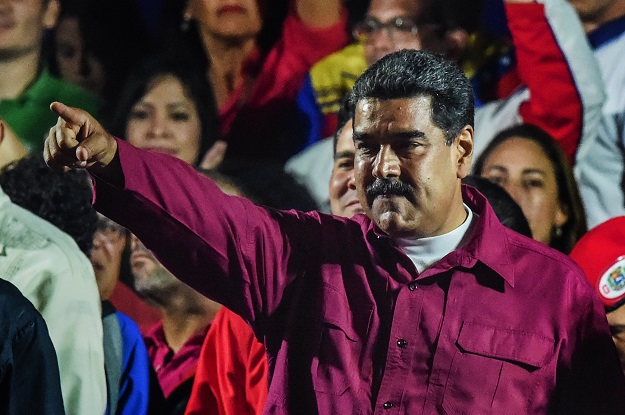The United States and other countries are likely to apply additional economic and diplomatic pressure on the Venezuelan government following President Nicolas Maduro’s victory Sunday in elections that most of the opposition had boycotted and that international community had denounced as a farce. The measures are unlikely to hasten a democratic transition, however, unless the Maduro regime faces greater pressure from its own populace.
International pressure thus far has not been insubstantial. The Trump administration has sanctioned Maduro and dozens of senior Venezuelan officials for corruption, drug trafficking and human rights abuses. It has also limited transactions involving Venezuelan bonds and the country’s new cryptocurrency. Canada, Switzerland, Panama and the European Union, meanwhile, have imposed sanctions of their own. Latin American leaders have collectively condemned the Venezuelan government for its authoritarian ways.
And yet Maduro remains entrenched in power – even as his policies have produced shortages of food and medicine and the world’s highest inflation rate and deepest economic contraction. Maduro, initially dismissed as the blundering heir of former President Hugo Chávez, has managed to marginalize political competitors and others who have advocated for saner economic policies and political concessions. The international sanctions have induced relatively few high-level defections from the regime, and financial support from Russia and China have helped Maduro mitigate their impact.
To be sure, there are other steps the democratic international community can take to increase pressure on Maduro and his allies. The OAS could suspend Venezuela from the organization. The International Criminal Court could initiate investigations of crimes against humanity committed by Venezuelan political and military leaders. And the United States could, in addition to sanctioning more senior Venezuelan officials, take steps that would further weaken the Venezuelan economy.
For more than a year, the Trump administration has considered imposing more severe economic sanctions, including a potentially devastating ban on oil imports from Venezuela. But officials have been hesitant to take that step because adverse consequences – including greater privation for the Venezuelan people and a larger flow of refugees into neighboring countries – are more certain to manifest than a transition to democratic rule.
Following Sunday’s election, an oil embargo and other intermediate steps will be debated anew. Administration officials have prepared for the president’s review a series of measures, including the oil import ban, though a targeted blow to the sector that accounts for 95 percent of Venezuela’s exports may seem less of an imperative now with the country’s oil production collapsing due to mismanagement.
Domestic political considerations could also weigh against such a move. Oil prices have been rising, and Americans are paying more for gasoline. Trump might be wont to take any action that would lead to even higher gasoline prices as the summer driving season starts and mid-term elections approach.
Venezuelan opposition leaders are hopeful for additional international action and looking to the United States and other countries to help extricate them from the calamity their government has imposed. But whatever steps the U.S., or other countries, take in the wake of the elections, they are much more likely to trigger a political transition in Venezuela if the regime confronts domestic political pressure.
Unfortunately, the Venezuelan people have been largely demobilized. The political opposition has had to abandon large-scale protests given Venezuelans’ fear of repression by security services and their focus on merely finding the basic goods they need to survive. Sunday’s election could have been a tool to mobilize people if the opposition had chosen to compete in an unfair process and forced the regime to either recognize defeat or commit levels of election day fraud that would enrage Venezuelan voters.
Without a viable path for political change and economic recovery, some Venezuelans are desperately hoping for long-shot measures, including a foreign military invasion or a military coup. But an invasion is not among the options the U.S. or other countries is considering, even though Trump asked advisers why the United States couldn’t simply invade Venezuela as it has other countries. Some American officials have hinted at the desirability of a coup, but it seems misguided to view as a democratic savior a security service indoctrinated in socialist and anti-American thinking, armed and trained by Russia, China and Cuba, active in drug trafficking, and responsible for killing Venezuelan citizens.
The suffering in Venezuela is so severe that it is understandable that Venezuelans and those who care about the country feel frustrated by the failure thus far of more conventional means to promote a democratic transition. But the Maduro regime has yet to feel the full brunt of combined domestic and international pressure. Accomplishing that should be the focus for international policymakers and Maduro’s domestic opponents in the coming weeks and months.
—
Mark Feierstein is a senior advisor at the Albright Stonebridge Group. He was special assistant to President Obama and senior director for Western Hemisphere Affairs on the National Security Council.








